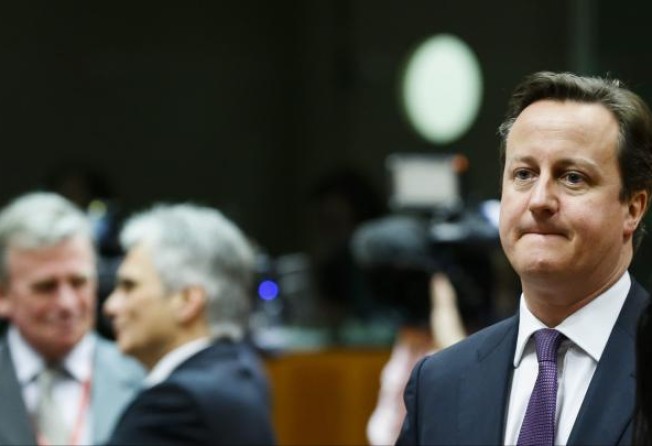EU leaders clash on crunch budget

EU leaders have clashed on the bloc’s future budget as Britain leads a campaign for massive spending cuts while France and Italy argued for a budget driving jobs and growth.
Highlighting the divisions, the summit to decide the European Union’s budget for the remainder of the decade began more than six hours late on Thursday as leaders met in groups to try to reach a compromise.
German Chancellor Angela Merkel remained largely above the fray, with the dispute narrowing over many hours of talks to a handful of billions of euros -- and how to spend them.
Before Friday dawned, EU president Herman Van Rompuy said an agreement was within touching distance. “But we are not there yet,” he underlined.
Britain and France -- whose leaders failed to gather face-to-face at a planned pre-summit huddle -- were the main protagonists in a battle over spending priorities for next year-2020 that turned on whether proposals for a budget initially above one trillion euros would fall to around 900 billion (HK$9.41 billion).
That would be somewhat less than the previous seven-year budget for 2007-this year.
There is a North-South split on the point of the EU budget -- Mediterranean leaders tending to want Brussels to offer added value in long-term moves to stimulate economic growth and so bring down record unemployment currently above 26 million.
However, there was still no deal in sight when the 27 heads of state and government called a rest break in the small hours of Friday morning.
EU sources said the starting point was for cuts down to 960 billion euros (HK$10.0 trillion) for “commitments” and 913 billion (HK$9.56 trillion) for straight “payments” -- the actual spending limit favoured by British Prime Minister David Cameron.
These were targets agreed this week by French President Francois Hollande and German Chancellor Angela Merkel, according to one negotiator.
Cameron, for all he has isolated himself in the view of many diplomats with a decision to try and claw back powers from Brussels that would be put ultimately to a 2017 referendum, placed his cards on the table immediately.
He said: “When we were last here in November, the numbers that were put forward were much too high.
“They need to come down -- and if they don’t come down, there won’t be a deal.”
Czech counterpart Petr Necas also threatened a veto -- although senior officials have maintained for days that failure was not an option.
The president of the European Parliament, Martin Schulz, said lawmakers would have the final say, arguing that “backward looking” figures mooted in advance offered “the worst of all worlds.”
Schulz has said lawmakers are ready to throw out any agreement they think stunts Europe’s ambitions for the next decade.
The parliament is to stage a secret ballot on an eventual deal between leaders.
According to one well-placed diplomat, Italian premier Mario Monti said at the negotiating table: “We cannot accept a deal dictated by Great Britain -- a country we can’t even say with certainty will still be in the EU in 2017.”
The summit proper began almost six hours late, with the talks likely to last most of the night
Merkel had spoken in ultra-cautious terms as officials tried to bridge differences over the numbers that will shape priorities in the next seven-year budget.
Hollande said cuts that did not protect support for farmers and investment for growth at a time of record unemployment in Europe would not win his backing.
The European Commission initially wanted a 5.0 per cent increase in EU commitments to 1.04 trillion euros ($1.4 trillion) for the next year-20 budget.
Van Rompuy cut that back to 973 billion euros (HK$10.18 trillion) in November, and EU diplomatic sources said he could reduce this figure -- the maximum amount member states agree to contribute -- to around 957 billion (HK$10.0 trillion).
At the same time, the sources said, the total money to be actually spent would be reduced by around 30 billion euros to 905 billion euros (HK$9.47 trillion) - about one per cent of the EU’s total gross domestic product, a modest proportion compared with national spending levels.
Most of the EU’s budget goes to the Common Agricultural Policy to support farmers, and to Cohesion Funds, money spent to help new members catch up economically with richer partners.